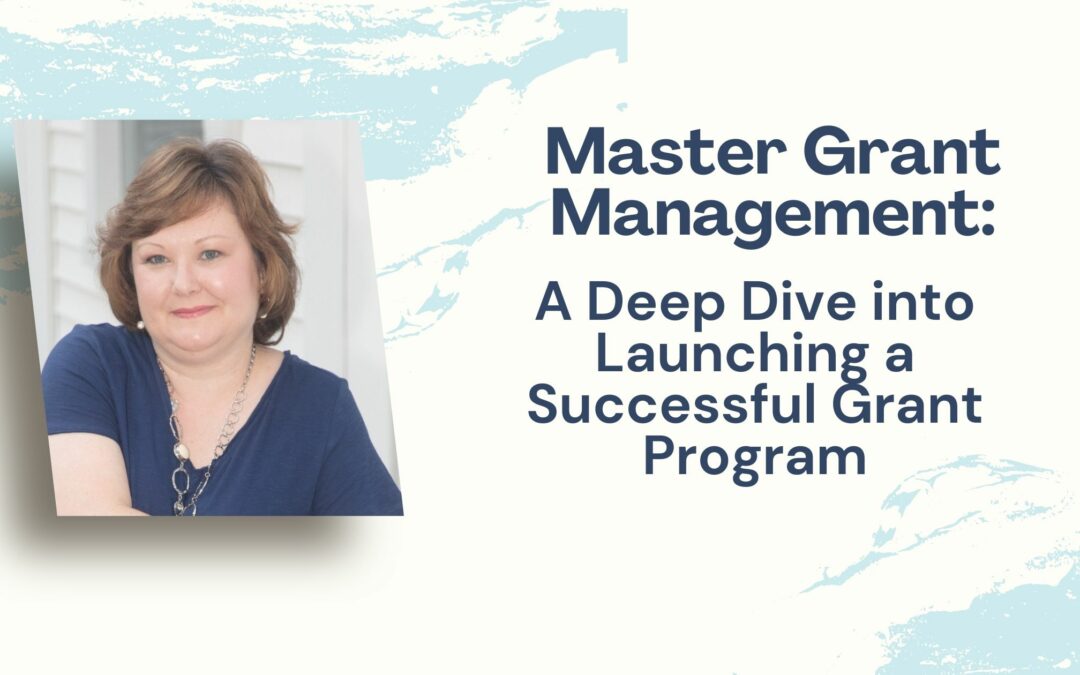In the nonprofit world, mastering grant management is pivotal to ensuring your organization’s success and sustainability. Whether you’re securing funding for new initiatives or maintaining ongoing projects, effective grant management can make all the difference. To help you navigate this complex landscape, we’re diving deep into the key themes and strategies presented in Alesha Mathis’s book Launching a Successful Grant Program. This post will explore strategic planning, building a capable grant management team, and implementing projects effectively—all critical components to mastering grant management.
Strategic Planning for Grant Management
One of the foundational themes in Launching a Successful Grant Program is the importance of strategic planning. Strategic planning isn’t just about identifying the grants you want to apply for—it’s about creating a comprehensive roadmap that aligns with your organization’s mission and long-term goals.
Key Strategies: Mathis emphasizes the need to develop a robust grant management plan that integrates with your overall strategic plan. This includes setting clear objectives for each grant, understanding the specific requirements of funders, and ensuring that your organization has the capacity to meet those requirements. Aligning your grant management efforts with your nonprofit’s strategic goals can create a more focused and effective approach to securing and managing funds.
Implementation Tips: To bring these strategies to life, start by thoroughly assessing your organization’s current grant management processes. Identify areas where you can improve, such as streamlining communication, enhancing data management, or refining your reporting procedures. From there, create a detailed action plan that outlines the steps needed to align your grant management with your strategic objectives.
Building a Grant Management Team
Successful grant management isn’t a solo endeavor—it requires a well-structured team with clearly defined roles and responsibilities. In Launching a Successful Grant Program, Mathis provides valuable insights into building and leading a grant management team that can effectively manage the entire lifecycle of a grant.
Team Structure: The book suggests creating a team that includes individuals with diverse skill sets, including grant writing, project management, financial oversight, and evaluation. By bringing together a team with complementary skills, you can ensure that all aspects of grant management are covered, from application to implementation and reporting.
Roles and Responsibilities: Each member of the grant management team should clearly understand their role and how it contributes to the overall success of the grant. For example, the grant writer is responsible for crafting compelling proposals, while the project manager oversees the implementation of the funded project. Financial oversight ensures that funds are used appropriately and evaluation specialists track the project’s progress and outcomes.
Collaboration: Effective collaboration and communication are crucial for a successful grant management team. Mathis highlights the importance of regular team meetings, clear communication channels, and shared tools that allow team members to stay informed and aligned on project goals and timelines.
Effective Project Implementation
Once a grant is secured, the real work begins—implementing the project effectively to achieve the desired outcomes. In Launching a Successful Grant Program, Mathis provides a comprehensive guide to planning, executing, and monitoring grant-funded projects.
Project Planning: The book stresses the importance of detailed project planning, including setting realistic timelines, assigning responsibilities, and anticipating potential challenges. By thoroughly planning your project, you can ensure that all team members are on the same page and that the project stays on track.
Monitoring and Evaluation: Ongoing monitoring and evaluation are essential to ensure that your project is meeting its goals and that any issues are addressed promptly. Mathis offers practical advice on using tools and techniques to track project progress, measure outcomes, and report back to funders. Regular monitoring also allows you to make data-driven decisions and adjust your project plan as needed.
Challenges and Solutions: No project is without challenges, but Launching a Successful Grant Program equips you with strategies to overcome them. Whether it’s managing unexpected expenses, dealing with staff turnover, or addressing delays, the book provides solutions to keep your project on course.
In-Depth Look at Tools and Strategies
In addition to the themes mentioned above, Launching a Successful Grant Program offers a wealth of tools and strategies for improving grant management.
Tools for Grant Management: Mathis recommends various software and resources that can help streamline your grant management processes. From grant tracking software to financial management tools, these resources can save time and reduce errors, allowing your team to focus on what matters most—achieving your nonprofit’s mission.
Best Practices: The book also outlines best practices for using these tools effectively. This includes tips on data management, communication, and reporting that can help you maximize the benefits of these tools and improve your overall grant management efficiency.
Case Studies and Real-World Examples: To bring these concepts to life, Launching a Successful Grant Program includes case studies and real-world examples of nonprofits that have successfully implemented the strategies outlined in the book. These examples provide valuable insights into how these strategies can be applied in different contexts and can serve as inspiration for your own grant management efforts.
Conclusion
Mastering grant management is not just about securing funds—it’s about ensuring that those funds are used effectively to further your organization’s mission. By diving into Launching a Successful Grant Program, you’ll gain a comprehensive understanding of the strategies and tools needed to excel in this area. From strategic planning and team building to project implementation and the use of specialized tools, this book offers invaluable guidance for nonprofits looking to improve their grant management practices.
If you’re ready to take your grant management skills to the next level, we encourage you to read Launching a Successful Grant Program and consider joining The Nonprofit Book Club by Alesha Mathis for deeper discussions and learning opportunities. Together, we can unlock the full potential of your nonprofit’s grant efforts and make a lasting impact.



Recent Comments